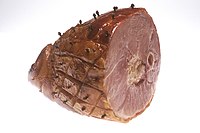
Photo from wikipedia
This study applied peptidomics to investigate potential biomarkers for evaluating pork-meat freshness. The spoilage time points of pork meat stored at −2, 4, 10, and 25 °C were defined by… Click to show full abstract
This study applied peptidomics to investigate potential biomarkers for evaluating pork-meat freshness. The spoilage time points of pork meat stored at −2, 4, 10, and 25 °C were defined by evaluating meat freshness indicators (color, total viable count, pH, and total volatile basic nitrogen). Peptide MVHMASKE was identified as a potential peptide marker via multivariate analysis. Pearson correlation revealed a negative correlation between intensity of MVHMASKE and total viable count/total volatile basic nitrogen. In addition, the correlation between peptide content and the change in pork-meat freshness was verified using real-life samples, and the content of MVHMASKE showed a significant decline during storage under 4 and 25 °C, correspondingly reflecting the change of pork meat from fresh to spoiled. This study provides favorable evidence to evaluate pork-meat freshness by monitoring the change of peptide MVHMASKE in content based on mass spectrometry-based peptidomics.
Journal Title: Foods
Year Published: 2022
Link to full text (if available)
Share on Social Media: Sign Up to like & get
recommendations!